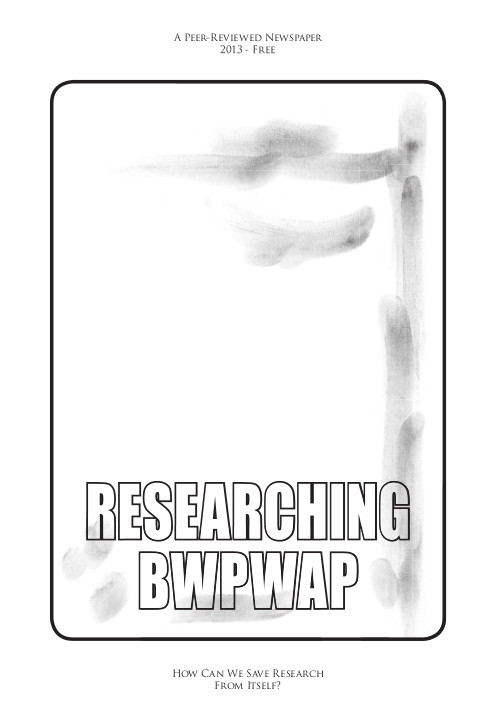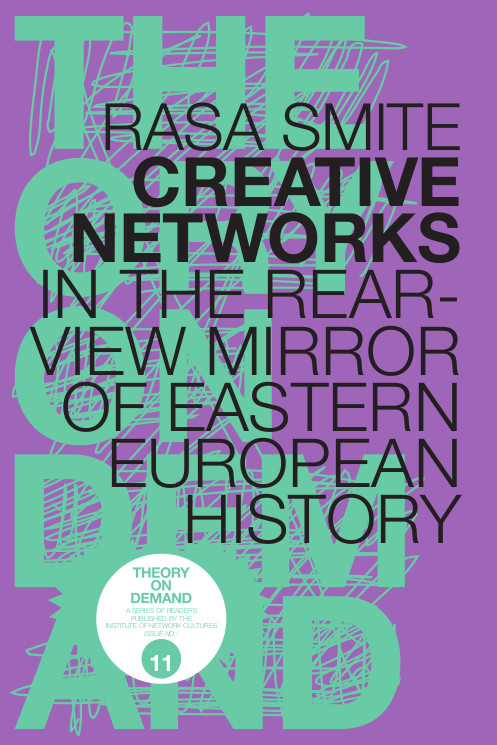A Peer-Reviewed Newspaper, 2(1): Researching BWPWAP (2013)
Filed under journal | Tags: · art, artistic research, code, design, economy, education, media art, net art, software

“In referring to the cancellation of Pluto’s planetary status in 2006, BWPWAP (Back When Pluto Was a Planet) – the 2013 edition of the transmediale festival – interrogates techno-cultural processes of displacement and invention, and asks for artistic and speculative responses to new cultural imaginaries. In light of this, the conference and workshop Researching BWPWAP took place in November 2012 in Lüneburg, Germany, organised jointly by Leuphana University of Lüneburg, Aarhus University and the reSource transmedial culture/transmediale. The call for participation focused on Ph.D. researchers and other participants to speculate on BWPWAP as a pretext for presenting their research and even to further reflect on its circulation as a meme.
This newspaper presents some outcomes of this process, and like the conference and workshop, can be interpreted in the context of a research culture that has been significantly destabilized by network culture and digital media. If the planet Pluto didn’t exactly fall prey to an epistemological break or a scientific revolution, but rather to a mundane administrative procedure – a redefinition of what constitutes a planet – then what does this say about contemporary research culture? Certainly, much research culture has shared Pluto’s fate: conferences reduced to networking events to foster cultural capital, and scholarly communications reduced to impact factors measured by grant givers. In other words, research is not just about measuring the performativity of a single researcher (the peer-reviewed journal system), but also the processes of questioning, investigating, speculating, and sharing between peers in a broader sense.” (from the Editorial)
Edited by Christian Ulrik Andersen and Geoff Cox
Publisher Digital Aesthetics Research Center, Aarhus University, Aarhus, in collaboration with reSource transmedial culture Berlin/transmediale, Berlin, February 2013
Creative Commons Attribution-NonCommercial-ShareAlike license
ISBN 8791810256
ISSN 2245-7593
PDF, PDF (updated on 2018-9-20)
Comment (0)Florian Cramer: Exe.cut(up)able statements: Poetische Kalküle und Phantasmen des selbstausführenden Texts (2011) [German]
Filed under book | Tags: · aesthetics, algorithm, avant-garde, code, code poetry, experimental literature, history of literature, information aesthetics, kabbalah, literature, net art, poetry, software, text, theory

“From the antiquity to today, there has been poetry that literally performs computations, processing its own letters. Prototyped by magic and Pythagorean mathematical aesthetics, it encompasses such diverse forms as kabbalist and Lullist language combinatorics, word permutation poetry, ludistic poetry, computational text collage, aleatoric, stochastic and recursive texts, Oulipian constraints, computer-generative literature, poetry in programming languages, and codeworks. Just like visual and sound poetry poetize the graphetic and phonetic dimensions of words, these writings show that computation is a dimension of language. On top of that, their poetics is rife with speculative and contradictory programs: often one and the same text form is at once being instrumentalized for total art and anti-art, mysticism and technicism, order and chaos. This has resulted in a fantastic literature whose speculative imagination manifests itself in the arrangement of letters rather than the semantics of the text. The book includes close readings of a 17th century sonnet (Quirinus Kuhlmann’s “XLI. Libes-kuss”), a 20th century musical composition (Alvin Lucier’s “I am sitting in a room”) and a 21st century net.art codework (mez breeze’s “_Viro.Logic Condition][ing][ 1.1_”), and discusses limitations of existing literary and media theory for criticism of these works.
A shorter, less scholarly English-language mutant of this book has been electronically published in 2005 as Words Made Flesh: Code, Culture, Imagination.”
Publisher Wilhelm Fink Verlag, October 2011
343 pages
Note: the book has just become free for Open Access publishing and is offered here for download in its manuscript version, licensed under Creative Commons Attribution Unported 3.0.
Comment (0)Rasa Smite: Creative Networks: In the Rearview Mirror of Eastern European History (2011/2012)
Filed under book | Tags: · actor-network theory, cyberfeminism, eastern europe, internet, internet art, internet culture, latvia, media art, net art, network culture, networks, sound art, virtual communities

“Creative Networks explores the dawn of the Internet culture in the age of network society from the perspective of Eastern Europe. From a theoretical angle the networks are introduced and interpreted as complex socio-technical systems. The author analyzes the development of these networked self-organized formations starting off with ‘virtual communities’ of ‘creative networks’, which emerged during the early phase of the Internet, up to the phenomena of today’s online ‘social networks’. Along with the translocal case studies of Nettime, Syndicate, Faces and Xchange networks (as well as with the other important facets of the 1990s network culture in Europe), the author studies also local community networking case of alternative and digital culture that evolved around E-Lab in the 1990s in Latvia. By focusing primarily on the network culture of 1990s, this study reflects those changes in the social structure of today’s society that are occurring under the process of socio-technical transformation.
The book is based on a dissertation by Rasa Smite, with the title Creative Network Communities and was defended in Riga Stradins University, February 2011.”
First published in Latvian in Riga: RIXC and Liepaja: LiepU MPLab, 2011.
Translated by Linda Vebere
Publisher Institute of Network Cultures, Amsterdam 2012
Creative Commons Attribution Noncommercial No Derivative Works 3.0 Netherlands License
ISBN 9789081857505
160 pages
Review: Piibe Piirma (Baltic Screen Media Review, 2014).
PDF (updated on 2023-9-27)
Comment (0)
